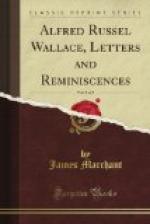“A keen young naturalist in the North of England, taking part in an excursion to the New Forest, called on Wallace and confided to him the dream of his life—a first-hand knowledge of tropical nature. When I visited ‘Old Orchard’ in the summer of 1903, I found that Wallace was intently interested in two things: his garden, and the means by which his young friend’s dream might best be realised. The subject was referred to in seventeen letters to me; it formed the sole topic of some of them. It was a grand and inspiring thing to see this great man identifying himself heart and soul with the interests of one—till then a stranger—in whom he recognised the passionate longings of his own youth. By the force of sympathy he re-lived in the life of another the splendid years of early manhood.”
The late Prof. Knight recalled meeting him at the British Association in Dundee, during the year 1867, when Wallace was his guest for the usual time of the gathering. He wrote:
I, and everyone else who then met him at my house, were struck, as no one could fail to be, by his rare urbanity, his social charm, his modesty, his unobtrusive strength, his courtesy in explaining matters with which he was himself familiar but those he conversed with were not; and his abounding interest, not only in almost every branch of Science, but in human knowledge in all its phases, especially new ones. He was a many-sided scientific man, and had a vivid sense of humour. He greatly enjoyed anecdote, as illustrative of character. During those days he talked much on the fundamental relations between Science and Philosophy, as well as on the connection of Poetry with both of them. When he left Dundee he went to Kenmore, that he might ascend Ben Lawers in search of some rare ferns.
In 1872 I saw him, after meeting Thomas Carlyle and Dean Stanley at Linlathen, when Darwin’s theory was much discussed, and when our genial host—Mr. Erskine—talked so dispassionately but decidedly against evolution as explanatory of the rise of what was new. A little later in the same year Matthew Arnold discussed the same subject with some friends at the Athenaeum Club, defending the chief aim of Darwin’s theory, and enlarging from a different point of view what Wallace had done in the same direction. I remember well that he characterised the two men as fellow-workers, not as followers, or in any sense as copyists. Wallace’s versatility not only continued, but grew in many ways with the advance of years. It was seen in his appreciation of the value of historical study. Quite late in life he wrote: “The nineteenth century is quite as wonderful in the domain of History as in that of Science.” Comparatively few know, or remember, that he and his young brother Herbert—on whom he left an interesting chapter in memoriam—both wrote verses, some of which were of real value.
It may be safely said that few scientific




